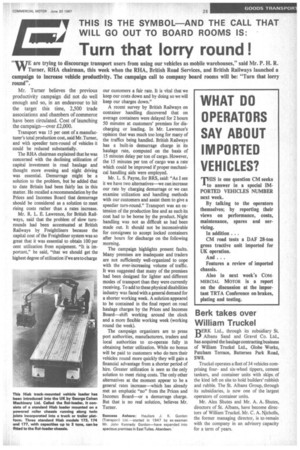THIS IS THE SYMBOL AND THE CALL THAT WILL GO OUT TO BOARD ROOMS IS:
Page 27

If you've noticed an error in this article please click here to report it so we can fix it.
Turn that lorry round !
L are trying to discourage transport users from using our vehicles as mobile warehouses," said Mr. P. H. R.
Turner, RHA chairman, this week when the RHA, British Road Services, and British Railways launched a campaign to increase vehicle productivity. The campaign call to company board rooms will be: "Turn that lorry round".
Mr. Turner believes the previous productivity campaign did not do well enough and so, in an endeavour to hit the target this time, 2,500 trade associations and chambers of commerce have been circulated. Cost of launching the campaign—over £2,000.
Transport was 15 per cent of a manufacturer's total production cost, said Mr. Turner, and with speedier turn-round of vehicles it could be reduced substantially.
The RHA chairman explained that he was concerned with the declining utilization of capital investment in road haulage and thought more evening and night driving was essential. Demurrage might be a solution to the problem, but he added that to date Britain had been fairly lax in this matter. He recalled a recommendation by the Prices and Incomes Board that demurrage should be considered as a solution to meet rising costs rather than a rates increase.
Mr. R. L. E. Lawrence, for British Railways, said that the problem of slow turnrounds had been accentuated at British Railways by Freightliners because the capital cost of the Freightliner system was so great that it was essential to obtain 100 per cent utilization from equipment. "It is important," he said, "that we should get the highest degree of utilization ifwe are to charge our customers a fair rate. It is vital that we keep our costs down and by doing so we will keep our charges down."
A recent survey by British Railways on container handling discovered that on average containers were delayed for 2 hours 50 minutes at customers' premises for discharging or loading. In Mr. Lawrence's 'opinion that was much too long for many of the traffics being handled. British Railways has a built-in demurrage charge in its haulage rate, computed on the basis of 15 minutes delay per ton of cargo. However, the 15 minutes per ton of cargo was a rate which could be improved if proper mechanical handling aids were employed.
Mr. L. S. Payne, for BRS, said: "As I see it we have two alternatives—we can increase our rate by charging demurrage or we can examine utilization and handling methods with our customers and assist them to give a speedier turn-round." Transport was an extension of the production line and as such its cost had to be borne by the product. Night handling was not as difficult as had been made out. It should not be inconceivable for consignees to accept locked containers after hours for discharge on the following morning.
The campaign highlights present faults. Many premises are inadequate and traders are not sufficiently well-organized to cope with the ever-increasing volume of traffic. It was suggested that many of the premises had been designed for lighter and different modes of transport than they were currently receiving. To add to these physical disabilities industry was faced with a general demand for a shorter working week. A solution appeared to be contained in the final report on road haulage charges by the Prices and Incomes Board—shift working around the clock and a more flexible working week (working round the week).
The campaign organizers are to press port authorities, manufacturers, traders and local authorities to co-operate fully in obtaining better utilization. While no bonus will be paid to customers who do turn their vehicles round more quickly they will gain a financial advantage from a shorter period of hire. Greater utilization is seen as the only solution to meet rising costs. The only other alternatives at the moment appear to be a general rates increase—which has already met an emphatic "no" from the Prices and Incomes Board—or a demurrage charge. But that is no real solution, believes Mr. Turner.
Success Ashore: Hauliers J. K. Gordon (Transport) Ltd.—started in 1947 by ex-seaman Mr. John Kennedy Gordon—have expanded into spacious premises in East Tulles, Aberdeen.
























































































































